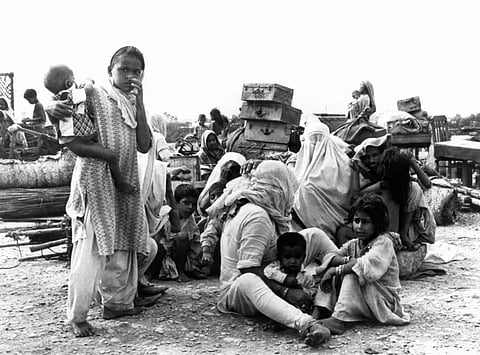Akhand Bharat Vs Fragmented India: Was Partition A Traumatic But Pragmatic Solution?
In political discourse these days, Mahatma Gandhi and Jawaharlal Nehru are often blamed for the 1947 Partition. Socialist thinker and leader Dr Ram Manohar Lohia, in his book “Guilty Men of India’s Partition,”
targeted the Congressmen. Proponents of Akhand Bharat and "Sone Ki Chidiya" criticize the leadership of the freedom movement for agreeing to the partition of India.
It is believed that the partition of India was wrong. Rather, Mohammad Ali Jinnah is portrayed as a villain in cinema. The basic question is, what would India be like in 2024 if the plan to divide India into two parts had not been made in 1947? Imagine what India would have looked like today and what would have been the the combined Muslim population of the country if the 1947 partition plan of the British had been rejected.
Political analyst Prof. Paras Nath Chaudhary says that if the 1947 partition plan had been rejected, "India would have been a very different country today or who knows how many Indias there would have been. The combined Muslim population would have been much higher, potentially at least 40 if not 50% of the population. This demographic shift would have had a profound impact on the cultural, political, and social fabric of the country."
Governance, identity, and communal relations would have been very different in a unified India with a population of 200 crore. Managing such a diverse and populous country would have been a major challenge, with a high probability of conflict on religion, language, and other grounds, says MK Agarwal, an 85-year-old retired government officer from Ghaziabad.
Social activist Mukta Gupta says, "Power dynamics on religious and regional grounds would have continued to be contested, possibly resulting in fragmented governance structures with competing centres of power. History shows that such a scenario can lead to frequent fighting, wars, and oppressive regimes."
The Partition of India, though traumatic, was a pragmatic solution to the political realities of the time, says social activist Padmini Iyer. “However, it came at a tremendous human cost, with millions of lives lost and communities torn apart in the name of religious identity.” Looking back, it is challenging to label Partition from a single perspective as right or wrong. It was a complex and multi-faceted event, with far-reaching consequences for all stakeholders. Indeed, Partition cannot be fitted into the framework of simple binary thinking of success or failure; it is a historical event that cannot be easily categorized.
As we consider alternative timelines, it is essential to recognize the realities of the past and the complexities of history. The Partition of India remains an important chapter in the collective memory of the subcontinent. Looking back, one might be tempted to believe that the entire region would have been in an 18th-century caged mentality with hundreds of Talibani-style Nawabs, Rajas, and Maharajas, their Jai Chands and Mir Jafars, constantly at war with each other.
The plight of the underprivileged classes, Dalits, and Adivasis would have been even worse, and women would have been enslaved across the country.
On the other hand, supporters of undivided India argue that undivided India would have been a powerful superpower, with one of the strongest militaries in the world, backed by economic and diplomatic might.
Undivided India could have evolved into a more inclusive society, where there would have been a haven for minority rights and religious harmony. Arguably, India would have been a completely different landscape without wars due to terrorism and territorial disputes, where there would have been an atmosphere of peace and stability.
Moreover, undivided India would have been a strong and influential voice on the global stage, which could have played a vital role in world peace and security. However, a lot of water has flowed in the rivers of both countries, so it would be better to abandon or forget the thoughts related to the tragedy of Partition. For now, we should all enjoy being citizens of a democracy, even though this system has many flaws, according to old socialist thinker Comrade Ram Kishore.

